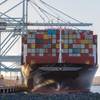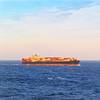Britannia Bulk Talks About Financial Difficulties
While the company has not yet concluded the review of its financial results for the three months ended September 30, 2008, the company expects to announce a significant net loss for the period compared to the net income achieved during the second quarter of 2008. The company believes that the expected loss will have resulted from the substantial decreases in dry bulk charter rates that occurred during the period, exacerbated by the company’s increase in chartered-in capacity during the same period and its entry into the forward freight agreements (FFAs) and a bunker fuel hedge more fully described below.
Historically the Company has chartered-in vessels to increase its overall dead weight tonnage capacity and enhance its service offering to customers. During the three months ended September 30, 2008 the Company increased its chartered-in capacity at a time when the demand for dry bulk shipping capacity decreased significantly. This decrease continued throughout the third quarter of 2008 and dry bulk charter rates fell substantially during the same period. As a result, the charter rates the Company achieved during the three months ended September 30, 2008 for its chartered-in vessels were less than the rates the Company paid to secure many of these vessels, resulting in significant losses.
A Forward Freight Agreement (FFA) is an agreement to pay the difference between a current price and the future price of moving a product from one location to another, or for the future price of hiring a ship over a period of time. FFAs are used by ship-owners and charterers as means of protecting themselves against the volatility of freight rates. For example, a ship-owner would typically sell FFAs to hedge against falling freight rates. Similarly, a charterer would typically buy FFAs to fix shipping costs. Positions in FFAs can be closed out by buying or selling opposing positions.
The Company has historically entered into dry bulk FFAs as economic hedges relating to identifiable ship or cargo positions and as economic hedges of transactions expected to be carried out in the normal course of its shipping business. None of the Company’s FFA derivatives qualify for hedge accounting; therefore, the net changes in derivative assets and liabilities are reflected in current period operations. In the past, the Company has entered into FFA contracts to provide a fixed number of theoretical voyages at fixed rates, with such contracts generally ranging from one month to one year and settling monthly based on a published index. For such contracts, the Company recognizes monthly realized gains or losses from FFAs concurrently with monthly cash settlements. In addition, unrealized gains or losses on the FFAs are recorded in the Company’s statement of operations under “gains on forward freight agreements”.
Entering into FFAs can lead to material fluctuations in the Company’s reported net income on a period to period basis. Since July 2008, the Company bought FFAs that appear not to have been purchased to hedge identifiable ship or cargo positions. This resulted in the Company being more exposed to the falling charter rates and reduced overall demand for dry bulk shipping services than it would have been if its historic practice of using FFAs as economic hedges had been followed. In marking these FFAs to market, the Company expects to recognize a significant realized loss for the three months ended September 30, 2008. Cash settlement of such FFAs is scheduled to commence in the fourth quarter of 2008 and continue into 2009.
An independent committee of the Company’s Board of Directors has resolved to retain an external advisor to assist it in determining how the Company came to enter into these FFAs.
If the Company’s vessels are time-chartered out to third parties, the charterer pays for the bunker (fuel and oil). In such instance, any inflationary pressure on the cost of bunker fuel does not affect the Company’s results of operations. If, however, the Company’s vessels are employed under contracts of affreightment (COAs) or spot charters, the freight rates it receives are generally sensitive to the price of bunker fuel. A rise in bunker costs can sometimes have a negative temporary effect on the Company’s results since freight rates generally adjust upwards only after bunker fuel prices settle at a higher level. To mitigate the risk of this temporary effect, and in light of recent substantial movements in the price for bunker fuel, the Company has in the past entered into hedging arrangements whereby it purchased a fixed quantity of bunker fuel, calculated against identifiable COAs, at a fixed price to be delivered over a specified period of time.
Bunker fuel hedges are designated as cash flow hedges for accounting purposes and, accordingly, unrealized gains or losses resulting from changes in fuel prices are recorded in other comprehensive income (loss), a component of stockholders' equity.
In the three months ended September 30, 2008, the Company entered into a bunker fuel hedge which is currently uncompetitive because it is hedged to prices which are significantly above the current market price of bunker fuel. As a result, the Company currently estimates that its aggregate bunker fuel hedging losses for the three months ended September 30, 2008 will be significant.











